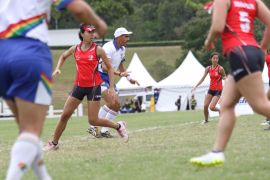Touch in Translation
24 Oct 2021 @ 0:00 UTC
Teamwork from Touch France guarantees the Federation of International Touch (FIT) fifth edition rule changes have been rendered perfectly to French.
Touch France board member and current European Federation of Touch (EFT) Director of Referees Sylvain Charras recently brought together a team of compatriots to undertake the time consuming and challenging task of translating the Federation of International Touch (FIT) 5th edition rule changes into his native tongue. According to Sylvain some of the other European Touch nations are following suit, “I know that Bulgaria, Portugal, Italy and Spain are working on their translations.”
Sylvain and his team decided that the best course of action was to not only translate the latest rule changes but to start from scratch and do a completely new translation of the entire rule book. “The translation can’t be done by only one person; you need a team to do it. One person led the project and did the first version. Later we involved a second person for a first review and to challenge the first translation. The final evaluation was done by a group of reviewers.” This process was extremely thorough and took about three months to complete, “Lots of time was spent choosing the right words. It’s not an easy thing.”
Nothing lost in translation
Sylvain was determined to ensure that the updated translation did not undermine the true intention of the rules of Touch, “One of the main challenges when you start translating is to keep the meaning of the rules in your own language. We need to avoid introducing any of our own interpretations.”
Once he was happy with the accuracy of the translation, according to Sylvain Charras, “The biggest challenge was to communicate it and highlight the main changes between the two versions.”
The Touch France Referees Commission collaborated with their counterparts at the England Touch Association (ETA), “To prepare a summary of the main changes and organised online workshops to ensure the widest communication possible. Lots of communication has come from the EFT Refs Commission to facilitate the adoption of the new rules. Now we need to get feedback from the first events and then adapt our communication.”
Sylvain is sure that the 5th edition rule changes will be a success, “The (5th edition) rules don’t introduce major change. They are just formalizing the way the game has been played and refereed in the last few years. The great thing with this version is that it will be used by all nations.”
English rules in the international arena
It is obvious that for Touch to develop at the grassroots level around the world the rules of the sport need to be available in the languages of all participants. However, the international language of Touch is English. International matches are refereed in English. This of course is a challenge for players and referees whose first language is not English, “For non-native referees being in a fully English environment is very hard. It requires a lot of concentration and you often finish the day very tired with a headache, and you just want to go to bed,” said Sylvain.
One strategy adopted in Europe to assist non-English-speaking players and referees is for the referees to use a short and simple communication method invented by referee coach Matthew Boesen, “He introduced the concept of two-word communication,” Sylvain clarified. These short sharp two-word instructions include common Touch communications such as ‘Play on’ (Jouez), ‘Move up’ (Montez), ‘Hold please’ (Un momment s'il vous plait) and many more.
“You don’t need more than two words in each situation to manage the game. It’s quick and easy to learn these sentences and to understand them.”
Whichever language you speak EFT Director of Referees Sylvain Charras believes the rule changes will have a positive impact on the sport of Touch, “The introduction of the new rules offers a good opportunity to reinforce the relationship between the coach, players and referees to ensure that we agree on how the game should be played.”

